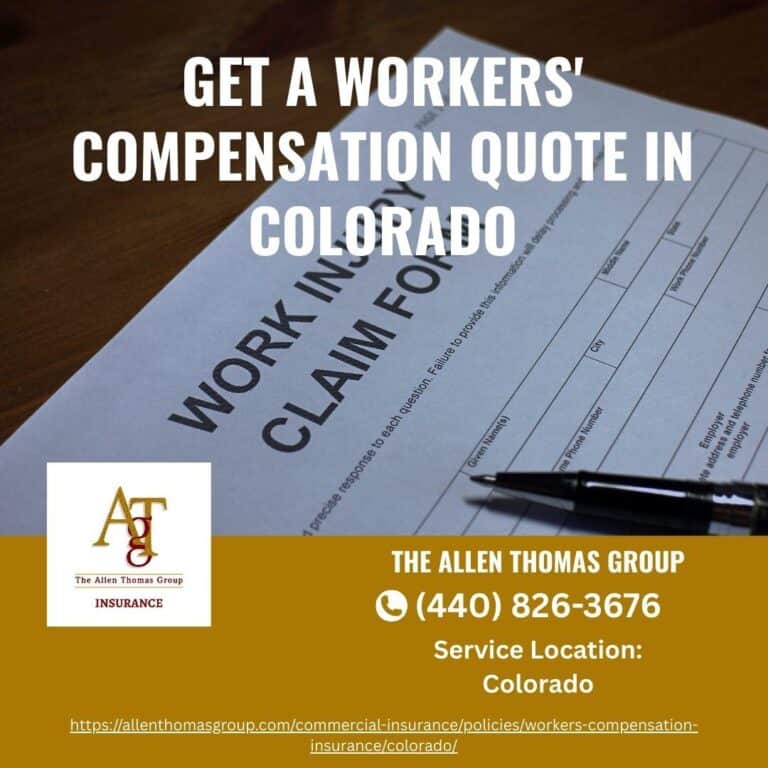Get A Precise Work Comp Insurance Quote For Your Colorado Business Now
It Just Takes A Few Clicks
Or Give Us A Call At (440) 826-3676

Access Comprehensive Protection for Your Business And Workers

At The Allen Thomas Group, we provide Colorado businesses with tailored workers’ compensation insurance that protects both your business and employees.
With over 20 years of experience helping business owners navigate the complex world of commercial insurance, we deliver workers’ compensation policies that meet statutory requirements while keeping your workers’ comp premiums calculated at competitive rates.
Contact us for a Free Quote Today!
Table of Contents
Understanding Colorado Workers Compensation Insurance Requirements
Workers’ compensation is a mandatory program designed to provide financial protection to employees who suffer work-related injuries or illnesses.
This coverage is legally required by the Colorado Department of Labor and Employment for virtually all employers in the state.
Mandatory Coverage for Colorado Employers
If you employ one or more part-time or full-time workers in Colorado, Colorado law requires you to carry workers’ compensation insurance. This coverage is required for all employees regardless of whether they work 40 hours per week or less, making compliance essential from the moment you hire your first employee.
Legal Framework Under Colorado State Law
Colorado workers’ compensation laws operate under a no-fault structure, meaning benefits are provided to injured workers regardless of who caused the workplace injury. This system creates predictable outcomes for employers while ensuring injured employees receive prompt medical care and lost wages benefits.
Exemptions for Business Owners and Officers
While workers’ comp insurance in Colorado is mandatory for employees, certain individuals may exclude themselves from coverage:
- Sole proprietors
- Business partners
- Corporate officers
- Member of a limited liability company (LLC)
These exemptions allow business owners to make strategic decisions about their personal coverage while still maintaining required protection for their workforce.
Complete Benefits of Workers Compensation Coverage in Colorado
A comprehensive workers’ compensation policy provides several critical benefits that protect your business and injured workers.
Medical Benefits for Work-Related Injuries
Workers’ comp benefits cover necessary medical care for workplace injuries and occupational illnesses, including:
- Doctor visits and specialist consultations
- Hospital stays and emergency care
- Surgical procedures
- Prescribed medications
- Physical therapy to help them recover
- Medical equipment
These medical benefits continue until the injured employee has reached maximum medical improvement.
Wage Replacement During Recovery Periods
When employees are injured on the job and cannot work, workers’ compensation provides partial wage replacement.
Colorado’s system typically pays two-thirds of the employee’s average weekly wage, subject to state-mandated maximum limits that changes each year.
Permanent Disability Compensation Options
For injuries resulting in permanent limitations, workers’ comp benefits provide:
- Permanent partial disability benefits for workers who sustain permanent impairments but can still perform some work
- Permanent total disability benefits for workers who are completely unable to return to gainful employment
These benefits provide long-term financial support proportional to the severity of the permanent impairment.
Death Benefits for Workplace Fatalities
In the tragic event of a workplace injury resulting in death, workers’ compensation coverage provides:
- Funeral and burial expense coverage
- Ongoing dependent benefits for a spouse or dependent child
- Coverage for related medical expenses prior to death
Colorado Workers Compensation Claims Process
Establishing clear procedures for handling work-related injuries helps ensure prompt care for injured workers while protecting your business interests.
Colorado workers’ compensation laws require employers to file a workers’ comp claim with their insurance company within 10 days of being notified of a work-related injury or illness. Prompt reporting is essential for processing the claim and helps avoid potential penalties for late reporting.
Employers must also file additional reports when an injured employee:
- Returns to work after a period of disability
- Has a change in employment status
- Has reached maximum medical improvement
- Is terminated during the claim period
These supplemental reports keep the claim process moving forward and document important changes in the employee’s status.
Many workers’ compensation insurance policies in Colorado, including those from Pinnacol and other private insurance carriers, offer access to designated provider networks. Using these networks can help control the cost of medical care while ensuring injured employees receive quality treatment from physicians experienced in occupational medicine and return-to-work strategies.
Implementing structured return-to-work programs helps injured workers recover while reducing claim costs. These programs may include:
- Modified duty assignments
- Gradual return schedules
- Workplace accommodations
- Transitional positions
Proper documentation of these efforts demonstrates good faith compliance with the Colorado workers’ compensation regulations.

Premium Determination and Cost Management Strategies
Understanding how much does workers comp in Colorado cost and how premiums are calculated allows you to implement effective cost-control measures.
Industry Risk Classification in Colorado
Workers’ compensation premiums are primarily determined by your business classification code, which reflects the risk level associated with your industry. Higher-risk industries naturally carry higher base rates than lower-risk operations like office work.
Experience Modification Factors
Your claims history directly impacts your workers’ comp insurance costs through an experience modification factor. Colorado businesses with fewer workplace injuries than the industry average can qualify for lower premiums, while those with more frequent or severe claims may face higher costs.
Premium Reduction Through Safety Programs
Implementing comprehensive safety programs can significantly reduce your workers’ compensation costs by:
- Preventing work-related injuries before they occur
- Demonstrating commitment to a safer workplace
- Qualifying for premium discounts
- Improving your experience modification rating
Workers Compensation Audits and Compliance
Regular payroll audits determine your final premium obligations. Accurate record-keeping and proper employee classification help avoid unexpected premium adjustments during these audits.
Employer Responsibilities and Compliance Under Colorado Law
Colorado employers have specific legal obligations related to workers’ compensation.
Employers must prominently display a Notice to Employer of Injury poster in the workplace. This poster informs employees of their rights and responsibilities regarding work-related injuries and illnesses and provides guidance on how to file a workers’ compensation claim.
Maintaining detailed records of all workplace injuries and occupational illnesses is required by the Colorado Department of Labor and Employment. These records must include:
- Date and time of injury
- Nature and extent of injuries
- Treatment provided
- Work status updates
- Accommodation efforts
Meeting statutory deadlines for injury reporting is essential for compliance. Key deadlines include:
- Employee reporting to employer: 4 working days
- Employer reporting to insurer: 10 days
- First payment of benefits: Within 20 days of first full day of lost time
While separate from workers’ compensation requirements, OSHA compliance complements your risk management efforts by:
- Identifying workplace hazards
- Establishing safety protocols
- Providing employee training
- Documenting safety efforts
Self-Insurance vs. Traditional Coverage Options in Colorado
Colorado employers have multiple options for securing required workers’ compensation coverage.
Eligibility Requirements for Self-Insurance
Larger employers may qualify for self-insurance if they meet specific criteria established by the Division of Workers Compensation:
- Minimum of 300 employees or $100 million in assets
- Strong financial stability
- Proven safety programs
- Administrative capability to handle claims
Comparing Coverage Options for Different Business Sizes
The Allen Thomas Group helps employers evaluate coverage options based on their specific circumstances:
- Small business owners typically benefit from traditional insurance policies
- Mid-sized companies may consider group self-insurance pools
- Large corporations often explore individual self-insurance options
Multi-State Operations Considerations
For businesses operating in Colorado and other states, coverage must comply with each state’s unique requirements, as workers’ compensation laws vary by state. The Allen Thomas Group provides guidance on multi-state compliance and coverage options that address varying jurisdictional requirements.
Legal Protections for Colorado Employers
Workers’ compensation insurance provides significant legal protections for compliant employers.
Colorado workers’ comp operates under the exclusive remedy doctrine, which limits an employee’s recovery for work-related injuries or illnesses to workers’ compensation benefits. This protection shields employers from potentially costly civil lawsuits related to workplace injuries.
With proper workers’ compensation coverage, employers gain immunity from most lawsuits alleging negligence for workplace injuries. This liability protection is one of the most valuable aspects of maintaining workers’ compensation compliance.
Most workers’ compensation policies include employer liability insurance, which protects against claims that fall outside the workers’ compensation system, such as:
- Third-party lawsuits
- Loss of consortium claims
- Certain dual-capacity situations
Penalties and Consequences of Non-Compliance in Colorado
Failing to purchase workers’ comp carries serious consequences.
Financial Penalties and Fines
Non-compliant employers lacking proper coverage face significant financial penalties, including:
- Daily fines for periods without coverage
- Responsibility for claim costs that would have been covered by insurance
- Potential civil penalties imposed by the Colorado Department of Labor and Employment
Increased Liability Exposure
Without workers’ compensation protection, employers lose the exclusive remedy shield and may face unlimited liability through employee lawsuits, potentially leading to judgments far exceeding what workers’ compensation benefits would have paid.
Business Operation Restrictions
Colorado authorities can issue stop-work orders for businesses operating without required workers’ compensation insurance, forcing operations to cease until compliance is achieved.
Steps to Correct Coverage Gaps
If you discover gaps in your Colorado workers’ comp coverage, immediate action is necessary:
- Contact The Allen Thomas Group promptly
- Secure appropriate coverage
- Report any recent injuries that occurred during the gap period
- Implement compliance procedures to prevent future lapses

Tailored Worker's Comp Insurance Solutions Built For Your Business
We know how frustrating and complex the process of finding the right business insurance in Colorado can be and how it slows down your ability to care for your customers. Let us help craft a policy that works for you.

Tell us about your specific needs and we will find the right policy for you.

Review the results of our search.

We will walk you through your new policy step by step.
Our Commercial Insurance Carrier Partners
That allows us to find the best rates for your business.









The Allen Thomas Group Advantage for Colorado Businesses
Our licensed Colorado Independent Insurance Agency specializes in creating tailored workers’ compensation solutions for Colorado businesses.
Customized Workers Compensation Policies
We reject one-size-fits-all approaches, instead designing coverage that addresses your specific industry risks, employee roles, and business operations.
Our tailored approach ensures you have appropriate workers’ comp insurance in Colorado without paying for unnecessary protections.
Industry-Specific Risk Assessment
Our licensed insurance agents conduct thorough risk assessments that identify potential exposure points specific to your industry.
This specialized knowledge allows us to secure competitive rates while maintaining comprehensive protection.
Dedicated Claims Management Support
When an employee is injured on the job, our team provides guidance throughout the claims process, helping you:
- Submit required documentation promptly
- Communicate effectively with adjusters
- Coordinate medical care through preferred provider networks
- Implement appropriate return-to-work strategies
Proactive Safety Program Development
We help clients develop effective safety programs that reduce injury frequency and severity while qualifying for premium discounts.
These proactive efforts protect your business and your bottom line.
Don’t settle for one-size-fits-all workers’ compensation insurance.
Protect your business and fulfill contractual requirements by obtaining proper insurance.
Call The Allen Thomas Group today at (440) 826-3676 to get a quote for workers’ compensation insurance in Colorado.
Let our experienced insurance agents help you navigate Colorado workers’ compensation laws and design protection that works for your unique needs.
Get More Insights On Making The Right Insurance Decision For Your Company
Does Colorado Require Workers' Compensation Insurance?
Yes, Colorado mandates workers’ compensation insurance for all businesses with one or more employees, regardless of whether they work part-time or full-time. Sole proprietors, corporate officers, LLC members, and working partners may elect to exclude themselves from coverage while still maintaining required protection for their workforce.
How Much Does Workers' Compensation Insurance Cost in Colorado?
Workers’ compensation premiums in Colorado vary based on industry classification codes, payroll size, claims history, and experience modification factors. Small businesses typically pay between $0.70 and $8.00 per $100 of payroll, with higher-risk industries like construction facing steeper rates than lower-risk operations like office-based businesses.
What is Rule 16 in Workers' Compensation in Colorado?
Rule 16 establishes the medical treatment guidelines and fee schedule that governs all work-related injury care in the Colorado workers’ compensation system. This regulation standardizes treatment protocols, determines reasonable costs for medical procedures, and outlines the responsibilities of treating physicians regarding documentation, billing practices, and utilization review procedures.
Cities We Serve Business Owners in Colorado
Alamosa
Applewood
Arvada
Aspen
Aurora
Avon
Battlement Mesa
Berkley
Berthoud
Black Forest
Boulder
Brighton
Broomfield
Brush
Cañon City
Carbondale
Castle Pines
Castle Rock
Centennial
Cherry Creek
Cherry Hills Village
Cimarron Hills
Clifton
Colorado Springs
Columbine
Commerce City
Cortez
Craig
Dacono
Dakota Ridge
Delta
Denver
Derby
Dove Valley
Durango
Eagle
Eaton
Edgewater
Edwards
Englewood
Erie
Estes Park
Evans
Evergreen
Fairmount
Federal Heights
Firestone
Fort Carson
Fort Collins
Fort Lupton
Fort Morgan
Fountain
Frederick
Fruita
Fruitvale
Glendale
Gleneagle
Glenwood Springs
Golden
Grand Junction
Greeley
Greenwood Village
Gunbarrel
Gunnison
Gypsum
Highlands Ranch
Johnstown
Ken Caryl
Lafayette
La Junta
Lakewood
Lamar
Littleton
Lochbuie
Lone Tree
Longmont
Louisville
Loveland
Manitou Springs
Milliken
Montrose
Monument
New Castle
Northglenn
Orchard Mesa
Parker
Pueblo
Pueblo West
Redlands
Rifle
Roxborough Park
Salida
Security-Widefield
Severance
Shaw Heights
Sheridan
Sherrelwood
Steamboat Springs
Sterling
Stonegate
Stratmoor
Superior
The Pinery
Thornton
Trinidad
Twin Lakes
Vail
Welby
Wellington
Westminster
Wheat Ridge
Windsor
Woodland Park
Woodmoor


